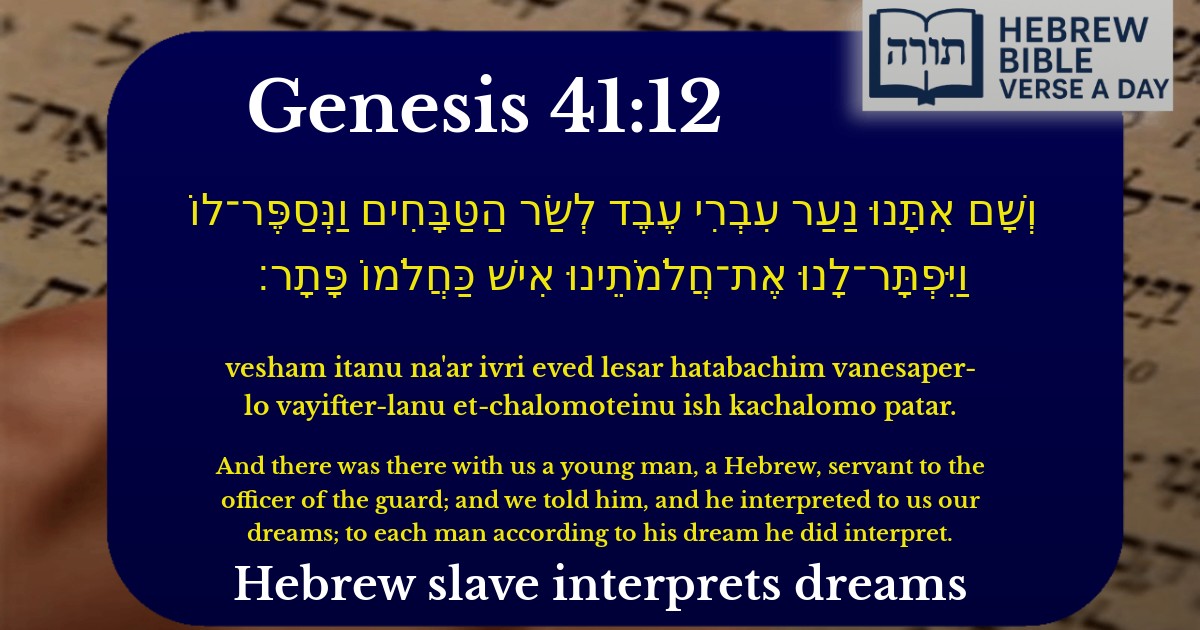Join Our Newsletter To Be Informed When New Videos Are Posted
Join the thousands of fellow Studends who rely on our videos to learn how to read the bible in Hebrew for free!
Hebrew Text
וְשָׁם אִתָּנוּ נַעַר עִבְרִי עֶבֶד לְשַׂר הַטַּבָּחִים וַנְּסַפֶּר־לוֹ וַיִּפְתָּר־לָנוּ אֶת־חֲלֹמֹתֵינוּ אִישׁ כַּחֲלֹמוֹ פָּתָר׃
English Translation
And there was there with us a young man, a Hebrew, servant to the officer of the guard; and we told him, and he interpreted to us our dreams; to each man according to his dream he did interpret.
Transliteration
Vesham itanu na'ar ivri eved lesar hatabachim vanesaper-lo vayifter-lanu et-chalomoteinu ish kachalomo patar.
Hebrew Leining Text
וְשָׁ֨ם אִתָּ֜נוּ נַ֣עַר עִבְרִ֗י עֶ֚בֶד לְשַׂ֣ר הַטַּבָּחִ֔ים וַ֨נְּסַפֶּר־ל֔וֹ וַיִּפְתׇּר־לָ֖נוּ אֶת־חֲלֹמֹתֵ֑ינוּ אִ֥ישׁ כַּחֲלֹמ֖וֹ פָּתָֽר׃
וְשָׁ֨ם אִתָּ֜נוּ נַ֣עַר עִבְרִ֗י עֶ֚בֶד לְשַׂ֣ר הַטַּבָּחִ֔ים וַ֨נְּסַפֶּר־ל֔וֹ וַיִּפְתׇּר־לָ֖נוּ אֶת־חֲלֹמֹתֵ֑ינוּ אִ֥ישׁ כַּחֲלֹמ֖וֹ פָּתָֽר׃
🎵 Listen to leining
Parasha Commentary
📚 Talmud Citations
This verse is quoted in the Talmud.
📖 Berakhot 55b
The verse is referenced in a discussion about dreams and their interpretations, illustrating how Joseph interpreted the dreams of Pharaoh's servants.
📖 Chullin 95b
Mentioned in the context of discussing the reliability of dream interpretations, using Joseph's example as a case of accurate interpretation.


The Hebrew Youth (Yosef) as an Interpreter
The verse describes Yosef (Joseph) as a "young man, a Hebrew, servant to the officer of the guard." Rashi (Bereshit 41:12) explains that the term "עִבְרִי" (Hebrew) emphasizes Yosef's distinct identity among the Egyptians, as he maintained his ancestral heritage and language. The Midrash (Bereshit Rabbah 89:7) notes that Yosef was called a "young man" ("נַעַר") even at age 30, signifying his humility and purity despite his elevated status.
Yosef's Divine Gift of Interpretation
The verse states that Yosef interpreted their dreams "אִישׁ כַּחֲלֹמוֹ" (to each man according to his dream). Ramban (Bereshit 40:12) explains that Yosef did not rely on human wisdom but on divine inspiration (רוח הקודש), as each interpretation matched the dreamer's unique circumstances. The Talmud (Berachot 55b) teaches that dream interpretation requires divine assistance, and Yosef's accuracy proved his connection to Hashem.
The Significance of "Servant to the Officer of the Guard"
Yosef is described as a "עֶבֶד לְשַׂר הַטַּבָּחִים" (servant to the officer of the guard). The Kli Yakar (Bereshit 41:12) highlights that this phrasing underscores Yosef's humility—despite his imprisonment, he faithfully served his role without resentment. Sforno adds that Yosef's position in prison was providential, preparing him for his future leadership by refining his character.
Lessons in Divine Providence
The Midrash Tanchuma (Vayeishev 8) emphasizes that Yosef's encounter with Pharaoh's servants was orchestrated by Hashem to set in motion his eventual rise to power. The verse hints at this by mentioning Yosef's presence ("וְשָׁם אִתָּנוּ"), suggesting divine placement. The Malbim explains that Yosef's interpretations were not merely for the servants' benefit but part of a larger divine plan to bring Yosef before Pharaoh.